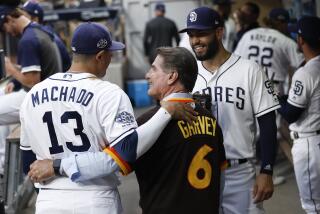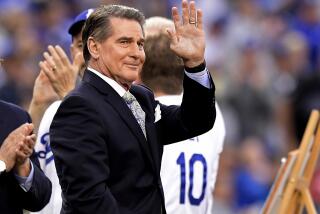Gary Hart Moves Closer to Making Presidential Bid
- Share via
WASHINGTON — Moving closer to a possible presidential campaign, former Sen. Gary Hart of Colorado said Friday that he intends to begin raising money and hiring a staff to more systematically explore entering the Democratic race.
“I think we will probably begin some preliminary fund-raising very soon, just to be able to test the waters,” Hart told The Times Friday.
Hart was in Los Angeles this week, delivering a speech at UCLA on economic policy and meeting with prominent Democrats -- including supporters of his 1984 and ’88 bids for the party’s presidential nomination.
Sources said some of those attending the meetings left with the impression that Hart already had decided to enter the crowded Democratic field.
But Hart said Friday that while he was “very encouraged” by the reception to a series of speeches over the last month, he has not made a decision. In the meetings, Hart said, “I told them where I was and what I was thinking ... and I’m sure I indicated that if I ran, I would want their help. But there was no unequivocal statement. I have made no decision.”
One supporter who attended the meetings also said that was the message Hart delivered.
Among those at the sessions in Los Angeles, sources said, were longtime Hart backers such as Warren Beatty, film executive Mike Medavoy and investment banker John Emerson, who was deputy campaign manager for Hart’s 1988 presidential bid. Democratic donor Haim Saban, a Los Angeles entertainment mogul, also attended.
Medavoy said Hart had been extremely well-received at the sessions. “If he decides to do it, I think he will pick up a lot of people,” Medavoy said.
Nine Democrats, the largest field in years, already have taken steps to enter the race for the party’s nomination.
Hart burst into the national limelight in 1984 when he nearly swiped the Democratic nomination from heavily favored Walter F. Mondale. He began the ’88 Democratic race as the front-runner. But Hart, who is married, was forced from the field amid a scandal about his relationship with model Donna Rice.
Hart spent much of the next decade out of the public eye before reemerging as the co-chairman, with former Republican Sen. Warren B. Rudman of New Hampshire, of a commission that warned of America’s vulnerability to terrorism before the Sept. 11 attacks.
Hart said that within the next week or two, he plans to begin raising money through the Internet and through a limited direct-mail appeal. He will use the money to hire a small staff and to continue traveling the country “for the next month or six weeks” as he finalizes his decision.
“I have invitations to campuses in particular, not all of which can pay for my travel,” he said. “I’d like to continue to do that, even if I am not being sponsored, and maybe make a couple of trips into the early states.”
Hart said he does not intend to register a formal presidential campaign committee with the Federal Election Commission. Instead, he plans to operate under the provision in federal law that allows a potential candidate to raise and spend a small amount of money to test the waters for a possible campaign without registering.
All funds raised for such an effort must comply with federal law, which limits individual contributions to $2,000, said Ian Stirton, a spokesman for the election commission.
Since signaling in January that he was considering the race, Hart has delivered a series of speeches on homeland security, foreign policy, civil society and the economy.
He has been a staunch critic of President Bush’s moves toward possible war in Iraq, insisting that the United States is not prepared for terrorist attacks that could come in retaliation for an invasion.
On Friday, Hart said the start of war could delay his announcement on whether he will enter the race.
“I don’t think, being on the brink of war, people particularly want more politics or people announcing their ambitions. So in terms of the timing of the decision, that would hinge increasingly on what would happen in the Middle East,” he said.
More to Read
Get the L.A. Times Politics newsletter
Deeply reported insights into legislation, politics and policy from Sacramento, Washington and beyond. In your inbox twice per week.
You may occasionally receive promotional content from the Los Angeles Times.










